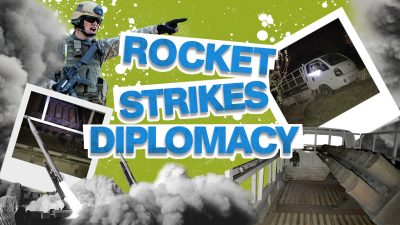Video: Iranian-backed Forces in Iraq Raise Stakes. Rocket Attack Kills Several US Coalition Troops in Iraq

A volley of rockets struck the Camp Taji military base in Iraq on the evening of March 11, killing three US-led coalition service members, two of them Americans and one British, and injuring 12 others. The targeted military base is a large facility located in a rural region approximately 27km north of Baghdad.
After the shelling, Iraqi security forces found the improvised rocket launcher used in the attack in the nearby area of Rashidiya. It was forty 107mm barrels installed on the back of a Kia Bongo truck. Three rockets were still remaining inside the barrel.
There were no immediate claims of responsibility for the attack. However, over the past months US-linked targets have witnessed a number of similar rocket attacks. Most of them led to no casualties. In general, US sources blame Kataib Hezbollah and other Iran-linked groups for these incidents.
The situation became especially tense after the US strike on a convoy of Iraqi and Iranian officers moving near Baghdad International Airport on January 3. The prominent Iranian general, commander of the Qods Force, Qassem Soleimani, was assassinated in this strike. The attack caused a large-scale crisis in the region, and prompted an Iranian retaliatiory missile strike on US military bases in Iraq. Washington swallowed a public attack on its forces by a state claiming that there were no casualties. In the following weeks, these ‘no casualties’ steadily turned into at least 110. All of them, according to the official version, received traumatic brain injury.
Additionally, the Iraqi Parliament accepted a bill demanding US troop withdrawal from the country, which Washington ignored, even threatening Baghdad with devastating sanctions, should Iraq continue to act like it is a sovereign, rather than occupied, country.
Following the attack on Camp Taji, ‘unknown aircraft’, most likely belonging to the US-led coalition, struck positions belonging to Iranian-backed groups near the Syrian-Iraqi border. The surroundings of the Syrian town of al-Bukamal, located on the highway linking Deir Ezzor and Baghdad, became the main target of the attack. Pro-Iranian sources claimed that the strikes caused material damage only.
Meanwhile, US forces in northeastern Syria strengthened their military positions by deploying additional howitzers. The Kurdish-led Syrian Democratic Forces declared in an official statement that the military buildup was needed to provide US bases with additional protection. Another troop withdrawal announced by the administration of President Donald Trump is apparently successfully ongoing.
Syria’s northwest is also a source of tensions. On March 11, intense fighting erupted among Turkish-backed armed groups in the town of Azaz. As always, the incident was caused by internal contradictions between Turkish proxies who are involved in a wide range of various criminal activities and regularly clash for spheres of influence.
In the region of Greater Idlib, Turkish-backed groups, including those linked with al-Qaeda, are preparing to sabotage another ceasefire deal. They reinforced their positions north of the M4 highway and east of Jisr al-Shughur and declared that they are not planning to withdraw from any areas south of the highway. These statements go contrary to Turkish claims that preparations for the creation of a security zone in the area and the start of joint Turkish-Russian patrols are successfully in progress. Despite these, Ankara continues blaming the Syrian government for supposed violations of the Moscow deal and threatening it with military action should the ceasefire be violated. It seems that Turkey once again seeks to sweep agreements regarding the withdrawal and neutralization of radicals under the carpet, thus pushing the region into a new round of military escalation.
*
Note to readers: please click the share buttons above or below. Forward this article to your email lists. Crosspost on your blog site, internet forums. etc.
Support South Front in its endeavors. If you’re able, and if you like our content and approach, please support the project. Our work wouldn’t be possible without your help: PayPal: [email protected] or via: http://southfront.org/donate/ or via: https://www.patreon.com/southfront

